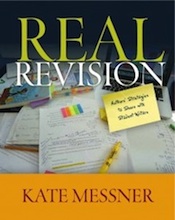
~Byrd Baylor, The Other Way to Listen
Revision responses should help the writer, not the writing, move forward. Allow your students to help you revise your own writing to model the process. Ask them these questions:
- What stayed with you?
- What did it make you think of?
- What questions do you have?
Encourage students to write comments on sticky notes as you read their writing aloud to them. This practice of reading aloud is so useful to student writers. It helps them to develop a writer’s ear for the music of the words. The following list is filled with some suggestions to try out when engaged in revision. Happy writing to all!
- Reread to discover the “inside story.”What are you really writing about?
- Write a different beginning.
- Write a different ending.
- Write the piece in a different tense.
- Use a multi-genre approach.
- Write in the third person instead of the first person.
- Write for a different audience.
- Find your center of gravity and begin there.
- Write the piece in a different format (a poem, letter, or feature article).
- Look at your verbs and nouns – are they specific?
- Try adding some dialogue.
- Write descriptions that appeal to a sense you have not evoked in this piece.
- Try to collaborate with a peer who is writing on the same theme or subject and rewrite.
- Read it aloud to see if the voice is working. Listen to the rhythm of your words.
- Check for unnecessary words (economy of expression).
- Step away from your work for several hours or wait until the next day – even the next week – to tackle revision again.


 RSS Feed
RSS Feed
